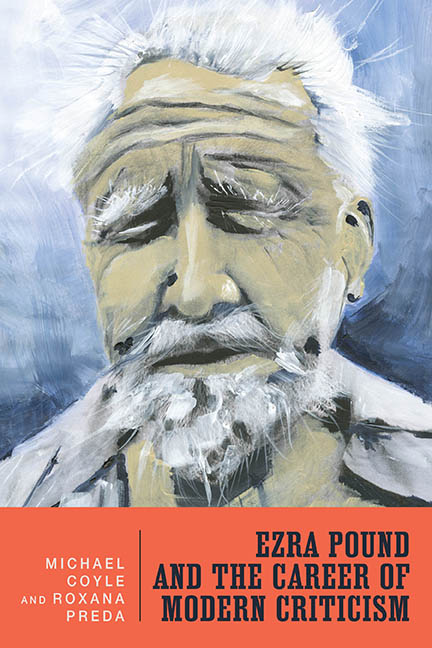Book contents
- Frontmatter
- Dedication
- Contents
- Preface
- Acknowledgments
- 1 From Wabash to Washington, 1907–1947
- 2 A Prize Fight and Institutionalization, 1948–1951
- 3 Kenner, Watts, and Professional Attention, 1951–1961
- 4 Sailing after Knowledge, 1962–1971
- 5 The Pound Era and Its Monumental Companion, 1971–1985
- 6 Pound Studies and the Postmodern Turn, 1980–1990
- 7 Reading Pound in the New Millennium, 1990–2016
- 8 The Many Lives of Ezra Pound: Biographies and Memoirs, 1960–2015
- 9 Educating the World: Periodicals on Ezra Pound, 1954–2017
- Conclusion
- Chronology of the Bollingen Controversy
- Works Cited
- Index
- Frontmatter
- Dedication
- Contents
- Preface
- Acknowledgments
- 1 From Wabash to Washington, 1907–1947
- 2 A Prize Fight and Institutionalization, 1948–1951
- 3 Kenner, Watts, and Professional Attention, 1951–1961
- 4 Sailing after Knowledge, 1962–1971
- 5 The Pound Era and Its Monumental Companion, 1971–1985
- 6 Pound Studies and the Postmodern Turn, 1980–1990
- 7 Reading Pound in the New Millennium, 1990–2016
- 8 The Many Lives of Ezra Pound: Biographies and Memoirs, 1960–2015
- 9 Educating the World: Periodicals on Ezra Pound, 1954–2017
- Conclusion
- Chronology of the Bollingen Controversy
- Works Cited
- Index
Summary
The historical relevance of literature is not based on an organization of literary works which is established post factum, but on the reader's past experience of the “literary data.”
—Hans Robert Jauss, “Literary History as a Challenge to Literary Theory”THE RECEPTION HISTORY of Ezra Pound arguably entails the history of academic criticism itself. To make that argument is not necessarily to reaffirm Hugh Kenner's vision of “the Pound era,” but rather to recognize that, after the Second World War, Pound's work became the decisive battleground upon which the new critics initially established their dominance, and over which subsequently swept successive forms of feminist and poststructuralist theory. Pound's work was and remains a challenge to all critical models. At once inviting and resisting exegesis, The Cantos in particular has been for three quarters of a century the ultimate proving ground. By the second decade of the twenty-first century, questions of canonicity came to seem less urgent, but Pound's work continues to attract new approaches, even if these no longer accelerate more general professional anxieties and concerns. In other words, without ever having achieved unchallenged canonical status, Pound's work has long been central to questions of what disciplinarity in English might mean.
Professional attention, in the context of Anglo-American departments of English, is shaped and regulated by the dynamic rules of disciplinarity. These rules have changed over time, are changing still, and doubtless should change with the evolving role of academic writing and authority in the culture at large. But at any particular moment rules and conventions— both explicit codes and regulations like double-blind referees—as well as implicit conventions about fairness or avoiding merely ad hominem attacks—govern critical behavior. Academic communities are formed with inner dissensions and agreements—the strength lies in numbers and in the endless revision of accepted and shared knowledge. Moreover, such expectations govern not just what is said, and how, but also where such work is suitably published.
- Type
- Chapter
- Information
- Ezra Pound and the Career of Modern CriticismProfessional Attention, pp. ix - xivPublisher: Boydell & BrewerPrint publication year: 2018

